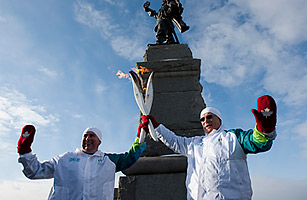
Torchbearer Bryan Murray, right, general manager of the Ottawa Senators hockey team, hands the Olympic flame to Stephen Hale on the Samuel de Champlain lookout above the Ottawa River during the 2010 Vancouver Olympics torch relay
Watch out, world. They are coming after you, on skeleton sleds, speed skates and, oh yeah, while wielding big old curling brooms. They used to be the nice guys (and gals); now they'd rather leave you buried in the snow on a ski trail. They will no longer be embarrassed.
Fellow biathletes and bobsledders, beware: the Canadian Olympic team is going to crush you.
Or so they say. With the Vancouver Olympics, which begin on Feb. 12, fast approaching, north-of-the-border expectations are at an all-time high. Canada has hosted the Olympics twice before — the 1976 Summer Games in Montreal and the 1988 Winter Olympics in Calgary. In both cases, no Canadian athlete won a gold medal on home soil. That's right; even though Canada is very cold and was blessed with home-field advantage in 1988, the country couldn't win a single Winter Olympics gold. They didn't even medal in ice hockey, Canada's own game.
Such lack of output is no longer acceptable. "They were reasonably pathetic performances," says Roger Jackson, a 1964 Olympic rowing gold medalist and CEO of Own the Podium, an organization that has received about $109 million in government and private funds over the past five years to develop athletes for the Vancouver Olympics. "I can tell you that we're going to have several gold medals this year," he says. "I guarantee it." Whoa. Is a Canadian really issuing a freewheeling, Joe Namath–style guarantee? "It's a nice word, isn't it?" says Jackson.
What's gotten into Canada? For starters, check out Own the Podium's slogan: "Look out, we're going to 'OWN' you." It's a line better fit for some guy from New Jersey, not Newfoundland. "I mean, you know we didn't say on the podium," says Jackson, an avuncular guy who is clearly enjoying this famously low-key nation's take-no-prisoners approach. "We said own the podium. We're getting a little cocky here."
And a little selfish too. To boost its host-country advantage, Canada has gone so far as to limit competitors' access to facilities like the sliding track and downhill-skiing course in Whistler and the speed-skating oval in Vancouver. That has drawn the ire of foreign athletes, particularly the Americans, who've made a stink about it. "We tried to get into the facility this summer for training, but they were charging an insane amount of money to let us skate there every day," wrote Apolo Ohno, the U.S. short-track speed skater and five-time Olympic medalist, in an e-mail. "Personally, I wouldn't want to win or have success in that way."
In response, Canada shrugs. "It's a zero story," Jackson says. "The reality is that foreigners have used the facilities way beyond what was available in Salt Lake City [in 2002]. We have worked with every international federation, they have outlined all the expectations for access, they have all been met and exceeded." Wait a minute, did he just call the Americans "foreigners"? Very neighborly. But Jackson has a message for those scorned Olympians who want to stuff a maple leaf in Canada's face. "Relax," he says. "Just come and enjoy the Games."
What's the source of this newfound Canadian aggression? In part, you can thank the Yanks. After seeing how the U.S. medal count jumped from 13 in Nagano, Japan, in 1998 to 34 in Salt Lake City four years later, Canada realized it could also capitalize on its status as host. In Turin, Italy, four years ago, Canada finished with 24 medals (one behind the U.S. and five behind leader Germany); Jackson figures around 30 medals should give Canada the top spot in 2010.
Plus, officials insist that the nonchalance of the past was almost ridiculous. "We joke about it," Jackson says. "There's this wonderful old cartoon of a Canadian athlete with an international president who was handing out medals. It was sort of this Tiny Tim thing. 'Please sir, may we have a medal? Oh no? Well then, thank you for your kind consideration.' That was the Canadian motto. It was hilarious because it was mostly true. We just said, Look, this is nonsense. Let's have some fun with this; let's try to improve."
The Canadian goal is to win the most medals. You know, own that podium. And after the organization has spent $62 million in government funds to fine-tune the Canadian Olympic machine, Jackson's jocks had better deliver. What will happen if they don't fulfill his gold guarantee? "I'm going to try to find the quietest little island," says Jackson, "so that no one can find me." Surely, Canada would want to take out its pent-up aggression on him.